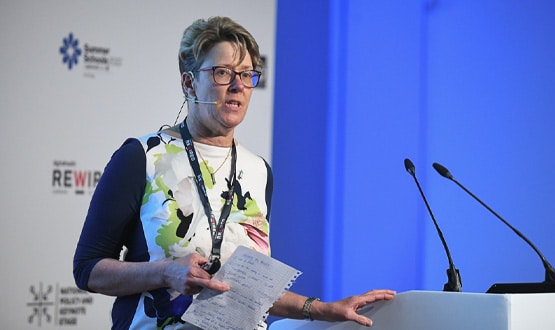Bryant says NHS Digital must become more responsive
- 30 March 2017

Beverley Bryant, director of digital transformation at NHS Digital, says the organisation needs to undergo a cultural revolution, move away from thinking of programmes “as king”, and become far more responsive to the needs of NHS customers.
She says a change in “mindset” and even “tone of voice” is required from the organisation to enable it to effectively support local NHS trusts, social care providers, CCGs and STPs in achieving their digital aspirations.
The goal she says must be to become a “responsive customer-focused partner of local NHS organisations”, and she argues the establishment of four new regional teams is a vital step in this direction.
In a wide-ranging interview with Digital Health News, Bryant says that too often in the past NHS Digital has been too inward facing and focused on making sure that its statistics were 100% accurate, rather than on whether customers were receiving the data they needed in a timely fashion.
Similarly, requests made by potential partners would sometimes go into a black hole, without any response.
NHS Digital needs to come out of its Leeds offices, she suggests: “The cultural difficulty is delivering on that requires us to be much more customer-focused and closer to the front line. We can’t stay in our offices and in an ivory tower.”
A key part of the cultural change needed will be to rebalance from its historic focus on running big programmes, many of which originated in the National Programme for IT (NPfIT) era. Establishing, managing and running major programmes around core NHS infrastructure and services, including summary care record, N3 and electronic referral service, still dominates much of the make-up of the agency.
“There has been a tendency for everything to be constructed around programmes,” says Bryant. She says these will continue to be hugely important, and integral to NHS Digital, but it must learn to deliver them as business as usual while being much more responsive to local NHS customers.
Achieving such cultural changes will require the organisation to regain its confidence, and Bryant acknowledges that care.data and the subsequent Partridge Review have had an impact on NHS Digital’s morale and subsequent appetite to take risks.
The real future test of success, she suggests, will be for the NHS Digital to effectively support STPs’ digital ambitions and achieve digitally-enabled transformation of the health and care system.




5 Comments
Slightly confused. Beverley has been at the heart of NHS Choices, NHS Digital, former CIO of Dept Health for many years now. So i find this completely ironic because she has been leading this. Its been her failings not anyone elses. NHS Digital has become.worse and a shadow of itself when it was first started as NHS Choices under her leadership. She has had many years to do this but somehow keeps getting recognised for achieving absolutely nothing. Typical government not what you know but who.you know.
Amen Andy. Well said ,Bev. It is a cultural revolution that’s required and it’s been required for some time https://www.digitalhealth.net/2012/11/joes-view-of-openness/ Question is, will NHS Digital have the courage to appoint a revolutionary as CEO?
So heartening to read this. I have been banging this drum in my own tiny way for a while now but it needs the big voices and big leaders inside the NHSD tent to vocalize, embrace and live this change. Looking forward to helping NHSD realise their new model 🙂
The most important customers of the NHS are all the citizens of the UK ! In my honest option it would help if you think of the customers as health consumers who are entitled to choice. The NHS should be using IT to give the health consumers access to their health data and to give them choice, that is what is happening in the grown up/non NHS world !
It’s good this is being recognised. Simply rebranding and playing musical chairs from NPfIT, C4H and HSCIC has had little or no impact on mindset. It’s always felt like the centre is building an empire, trying to own everything, being very technology-driven without sufficient focus on real world delivery and outcomes that add value for patients.
Comments are closed.